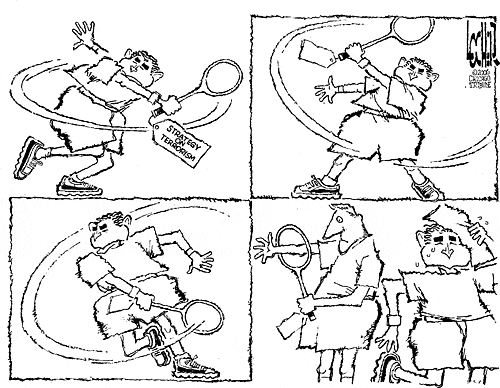WASHINGTON, Aug. 15 — President Bush made clear in a private meeting this week that he was concerned about the lack of progress in Iraq and frustrated that the new Iraqi government — and the Iraqi people — had not shown greater public support for the American mission, participants in the meeting said Tuesday.
Those who attended a Monday lunch at the Pentagon that included the president’s war cabinet and several outside experts said Mr. Bush carefully avoided expressing a clear personal view of the new prime minister of Iraq, Nuri Kamal al-Maliki.
But in what participants described as a telling line of questioning, Mr. Bush did ask each of the academic experts for their assessment of the prime minister’s effectiveness.
“I sensed a frustration with the lack of progress on the bigger picture of Iraq generally — that we continue to lose a lot of lives, it continues to sap our budget,” said one person who attended the meeting. “The president wants the people in Iraq to get more on board to bring success.”
Another person who attended the session said he interpreted Mr. Bush’s comments less as an expression of frustration than as uncertainty over the prospects of the new Iraqi government. “He said he really didn’t quite have a sense yet of how effective the government was,” said this person, who, like several who discussed the session, agreed to speak only anonymously because it was a private lunch.
More generally, the participants said, the president expressed frustration that Iraqis had not come to appreciate the sacrifices the United States had made in Iraq, and was puzzled as to how a recent anti-American rally in support of Hezbollah in Baghdad could draw such a large crowd. “I do think he was frustrated about why 10,000 Shiites would go into the streets and demonstrate against the United States,” said another person who attended.
The White House would not comment on the details of the discussion but a senior official warned against drawing conclusions on what the president thinks based on questions he asked in the process of drawing out the invited guests.
Participants said Mr. Bush appeared serious and engaged during the lunch, which lasted more than 90 minutes, as the experts went through a lengthy discussion of the political, ethnic, religious and security challenges in Iraq. And through it all, Mr. Bush showed no signs of veering from the administration’s policies to support the new government and train Iraqi security forces to take over the fight, and only then bring American troops home.
One participant in the lunch, Carole A. O’Leary, a professor at American University who is also doing work in Iraq with a State Department grant, said Mr. Bush expressed the view that “the Shia-led government needs to clearly and publicly express the same appreciation for United States efforts and sacrifices as they do in private.”
The White House began to open its doors to a wider range of views earlier this year, after acknowledging that months of complaints after Hurricane Katrina that the president and his team were isolated — “living in a bubble” was a frequent refrain — had gotten through. But that accelerated after Joshua B. Bolten became White House chief of staff in the spring.
One of the participants at the Monday lunch, Eric Davis, a Rutgers University political science professor who previously served as director of the university’s Center for Middle Eastern Studies, released a text of his remarks.
Mr. Davis said he discussed the regional upheaval that could follow if Iraq descended into chaos or was allowed to divide along ethnic lines. “I believe that the American people do not fully understand the potential domino effects that the collapse of Iraq into disorder and anarchy would have on the Middle East and the global political system,” he said.
Mr. Davis said he urged the creation of more jobs for younger Iraqis, and proposed a major reconstruction fund to be underwritten by Saudi Arabia and other Arab oil states seeking regional stability.
Although none of the academics openly criticized Bush administration policy, according to those in attendance, Mr. Davis did take issue with the administration’s order to remove Baath Party members from public service, and he urged the hiring of more qualified Baathists in Iraq or living abroad, and inviting retired army officers back into service.
Vali R. Nasr, an expert on Shia Islam, said the Pentagon meeting appeared to be an effort to give White House, Pentagon and State Department officials better insight into Iraq’s religious and ethnic mix.
“They wanted new insight, so they could better understand the arena in which they are making policy,” said Mr. Nasr, author of “The Shia Revival.” He said he got no sense that the Bush administration was contemplating a shift in its Iraq policy.
Some who have been brought into past meetings with President Bush, even fierce critics of the conduct of the Iraq war, give credit to the White House for beginning to listen to alternate viewpoints.
Gen. Barry R. McCaffrey, a retired Army commander who went to the White House in May, said he believed that Mr. Bolten has been largely responsible for bringing in new voices to counsel the president.
“They’re listening to new ideas and they’re listening to the reality,” said General McCaffrey, who has criticized Defense Secretary Donald H. Rumsfeld and believes that the Iraq war could break the United States Army.
But one critic of the administration’s management of the war effort said he remained unconvinced that the White House was actually listening to alternative viewpoints.
The critic, Senator Carl Levin of Michigan, the ranking Democrat on the Armed Services Committee, said in a telephone interview that “one of the hallmarks of this administration has been stubbornness to any change of approach.”
